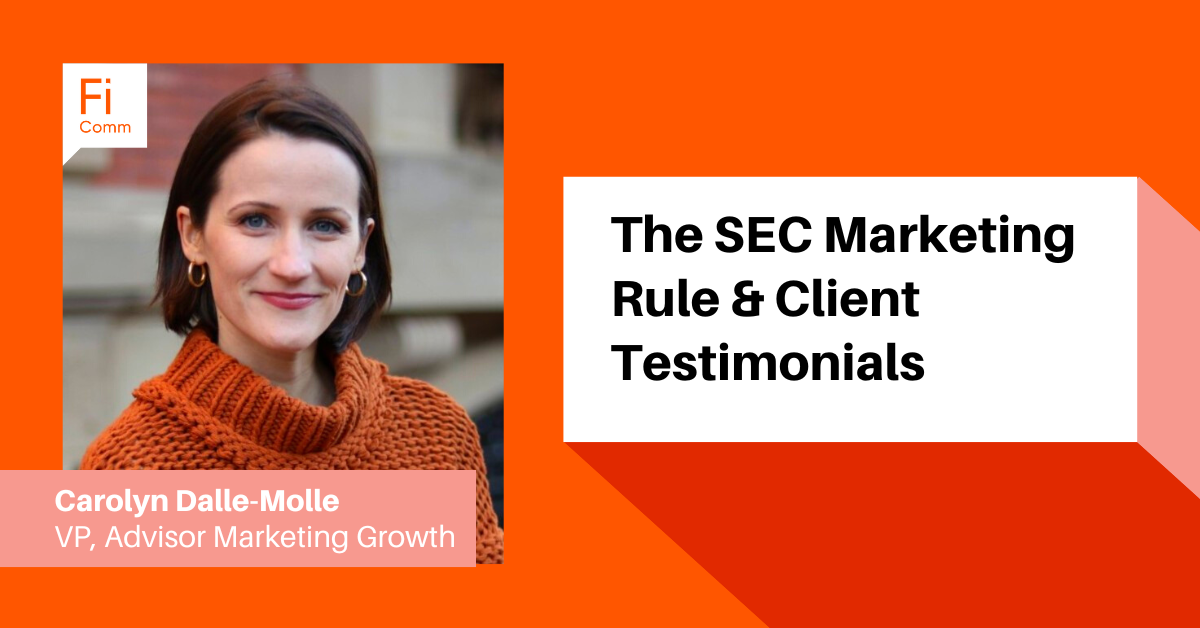
Ever since the Securities and Exchange Commission (SEC) passed its new Marketing Rule last December, there has been a lot of discussion in our industry around how financial advisors should solicit and incorporate online testimonials, endorsements and ratings into their digital marketing efforts.
In so many other industries, ratings, reviews and online testimonials have long reigned supreme in elevating a brand’s reputation and establishing social proof. The SEC rule now offers advisors those same opportunities, supplementing their digital advertising and marketing investments with further online validation from clients, COIs, and third parties on their value proposition.
Consider this: According to a 2018 study, 95% of consumers read online reviews before making a decision to engage with them, and 88% of consumers trust online reviews as much as a recommendation from a friend or a family member.
To address why and how online testimonials and endorsements impact advisors, we partnered with Akshay Singh, the President and CEO of Indyfin, an online search platform he describes as the “Yelp for RIAs,” for his thoughts.
“Testimonials are a powerful, ‘trust-building’ tool that has become a necessary and incredibly convenient way for prospective clients to do their due diligence on your business,” Akshay shares. “Think about it – if you get a referral from a friend on a great new restaurant, what is the very first thing you do? You do a Google search and read reviews, look at photos, and start to consider if this restaurant is right for you. Online testimonials help validate the referral.”
The first step in considering online testimonials, endorsements and ratings for your business is understanding what the SEC Marketing Rule includes. Here’s a quick recap:
- Advertisements. This is a big one. Advertisements refer to any communications sent to more than one person where you are soliciting your services.
- Online Testimonials, Endorsements and Third-Party Ratings – this is a very specific type of advertising under the SEC rule:
- Testimonials are statements that your current clients have made about your practice.
- Endorsements are statements made by individuals who are not your clients (third-parties, non-clients, COIs, etc.).
- Third-Party Ratings are rankings or ratings by people or organizations that are not related to your business (Think Google reviews, “top advisor” rankings, and the Better Business Bureau).
For this article, we’re focusing on client testimonials, but check out our blog for more detailed information and guidelines on the SEC Marketing Rule.
Getting Started with Online Testimonials Under the SEC Rule
When thinking about your approach to capturing and using client testimonials in your marketing strategy, consider these four things first:
- States Have Different Guidelines. Each state has their own regulations when it comes to adapting the new ruling. But even if your state doesn’t allow it for now, they may allow it soon! So be prepared with your approach.
- Check Your Compliance Rules. While the SEC rule outlines how an advisor can solicit and use online testimonials, your firm’s compliance may have additional guidelines and restrictions. Clarity is key.
- Testimonials Must Come From Current Clients. So, think about the clients you’d want to approach who would be your “brand ambassadors.”
- You Must Disclose Compensation. This one is tricky, because even gifts like a bouquet of flowers is considered compensation. A good rule of thumb is not to use any form of compensation for the online testimonial.
Best Practices for Maximizing Online Testimonials and Reviews
A big question we get from advisors is, “How do I go about getting testimonials from my clients?” Here are our recommendations to help you craft a strong testimonial strategy:
- First, understand your brand voice and ideal client. What are the psychographics of your ideal client? Having this defined is super important so you’re clear on what message, problem and resolution that you want to define in your testimonials. Sometimes this is a project in itself!
- Then you can identify who would be good “brand ambassadors”. Who amongst your clients have sung your praises? These are the people you would envision going online without solicitation to share their experiences working with you.
- Ask good questions to receive authentic stories. “Let’s be clear. Deciding on a wealth manager isn’t like choosing a taco place on a Saturday,” Akshay says. “It’s a complex life decision and a relationship that typically lasts years if not a lifetime. You won’t get many opportunities to ask for a testimonial, so you need to make it count.” Ask your clients how they would describe you to a friend. What were their expectations when they started working with you? What real, positive change did your relationship bring to their lives?
- Utilizing the testimonials once you have them. Once you get started, you might only have one or two testimonials, and that is ok! Akshay says, “Make sure the message that your brand ambassadors are communicating speaks to the value that your firm provides. That is the most important thing. If you can nail that in the first few testimonials, you're off to an awesome start.” You may choose to include one in a slide deck to capture a specific story, or once you’ve gathered a few, you might share on your website.
Depending on your goals for using testimonials, you can customize and personalize their use to help you continue to share your message and your services. And you need not be a large RIA to see results.
“As an advisor myself, the new marketing rule opens up many opportunities for individual advisors to compete with the bigger brands,” Akshay says. “Being intentional about who you approach, the questions you ask to help craft a very specific message, and how you implement these testimonials can offer you incredible opportunities to drive new business.”
Ready to start leveraging client
testimonials to drive leads?
Contact us to get started.